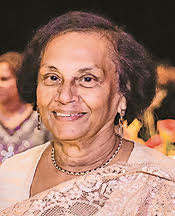
Source:Sundaytimes
As a young child, Fazeera Ismail’s family home in Hulftsdorp was an open house, always brimming with life and with people visiting. Her father was a lawyer; his offices were in front and the family lived at the back. With an open house comes an open kitchen and often, the household would be given short notice about guests arriving for meals. If the food cooked for the day wasn’t enough and there were surprise visitors, Fazeera and her siblings were gently nudged into the kitchen to whip up something to fill the food-gap.
Food was a key part of their everyday routine and the family took on an all-hands-on-deck approach to cooking and food planning. At the age of 11, Fazeera was able to prepare an entire meal. There was no TV and little entertainment, the programmes on the radio at the time had no appeal to children. Helping out with the food was the only thing there was to do, she explained. Her interest in food and cooking stemmed directly from this involvement in meal planning and her time in the kitchen when she was young.
Fazeera Ismail’s recipe book ‘Enjoy’ will be released in February this year and is a celebration of the cuisine of the Galle Fort Muslims. Her parents hailed from the Galle Fort and the food Fazeera grew up with and began cooking was a result of her ancestral influences.
‘Enjoy’ is a reminder that Sri Lankan Muslim cuisine isn’t homogeneous as many believe it to be and extends far beyond familiar staples such as biriyani and wattalapam. The cuisine is a confluence of the island’s history and also varies geographically. As Galle was a port city, it is also likely that visitors to the Fort left their mark on the cuisine of the Galle Fort Muslims as it stands today. Fazeera explains that for Galle Fort Muslims, the combination of dishes in ‘menus’ is sacrosanct.

Fazeera Ismail
“It’s like matching a saree with a blouse,” smiles Fazeera Ismail over a Zoom call, explaining why the menus are important. “Menus are a big thing in Galle Fort so I accentuated that,” she says.
What is described as a ‘menu’ are dish pairings or menu plans designed for specific meals. A Kanawa Shoru (calamari rice) menu in the cookbook pairs calamari rice, fried eggplant curry, pan fried potatoes and Maldive Fish sambol for a simple, hearty lunch. The Barnkoli badam menu (turkey with potato fries and nuts) takes time to prepare but combines different dishes to complement and elicit maximum flavour from each. The menu’s star is a turkey simmered in its own gravy and is served by layering fried nuts, potatoes and onions to create textures within the dish. The menu pairs the turkey with ghee rice, green peas curry, pineapple curry, yoghurt sambol, Galle pickle, ghee roti and bread rolls.
The book began a few years ago when she started collecting recipes and menu pairings to pass on to her family and as the project grew, her family urged her to publish it for a larger public. Fazeera, who lives in the US and worked as an educator and social worker, spent five years collecting and tweaking recipes, deciding which dishes to include.
One challenge while putting the book together was to codify techniques and ingredients that were honed through instinct over decades by assessing the look and feel of a dish. While compiling the book, Fazeera also developed renewed appreciation of the remarkably sophisticated tips and tricks embedded within seemingly modest cooking techniques in her family recipes which were passed on from one generation to another. Something as simple as roasting green gram before soaking it to make a curry renders flavour and texture to a green gram curry, effortlessly elevating taste. “I’m amazed that all this was looked into and how they came to these conclusions. Sometimes I think about how much time they would have spent in getting all these things perfect,” she says.
The recipe book has basics like rice featuring all the variations of rice which star in the cuisine of Galle Fort Muslims such as neishoru (ghee rice), koppashoru, parippushoru (dhal which is cooked with the rice) and more. It also features familiar hallmarks in Galle Fort cuisine such as France Appa which is a semolina and beef casserole baked in a lightly spiced, coconut custard as well as breadfruit and beef curry, avial (mixed yams, spinach and dry fish curry) and other dishes. A notable feature in the cook book and its cuisine is the emphasis on the produce. “We don’t use masala so much. Most people use coriander and fennel etc but we don’t. We believe that the taste of the food should be prevalent and not the masala,” says Fazeera.
A spinach and egg curry which features in the book, Fazeera explained, was introduced to her by her husband and was a part of his family food repertoire. The book is rounded off with pickles and sambols, gravies, drinks and desserts such as manga paal, sago, butter fruit cream and sanja.
‘Enjoy’ is also very much a labour of love. Her dishes were tested by her daughter and daughter-in-law. If Fazeera had a doubt about a recipe, she would reach out to her sisters. Family members and friends pitched in to lend design and photography skills. Six months ago, the book which was years in the making, reached completion thanks to the pandemic forcing life to a halt.
The recipe book offers substitutes for specific ingredients and clear recipes, offering a good introduction to the cuisine for anyone unfamiliar with it. “I think even a perfect stranger may be able to follow the instructions and get a good dish,” says Fazeera.
| Nivithi Mutta Aackie (Spinach and Egg Curry) Serves 4
Wash and thoroughly dry spinach. |







